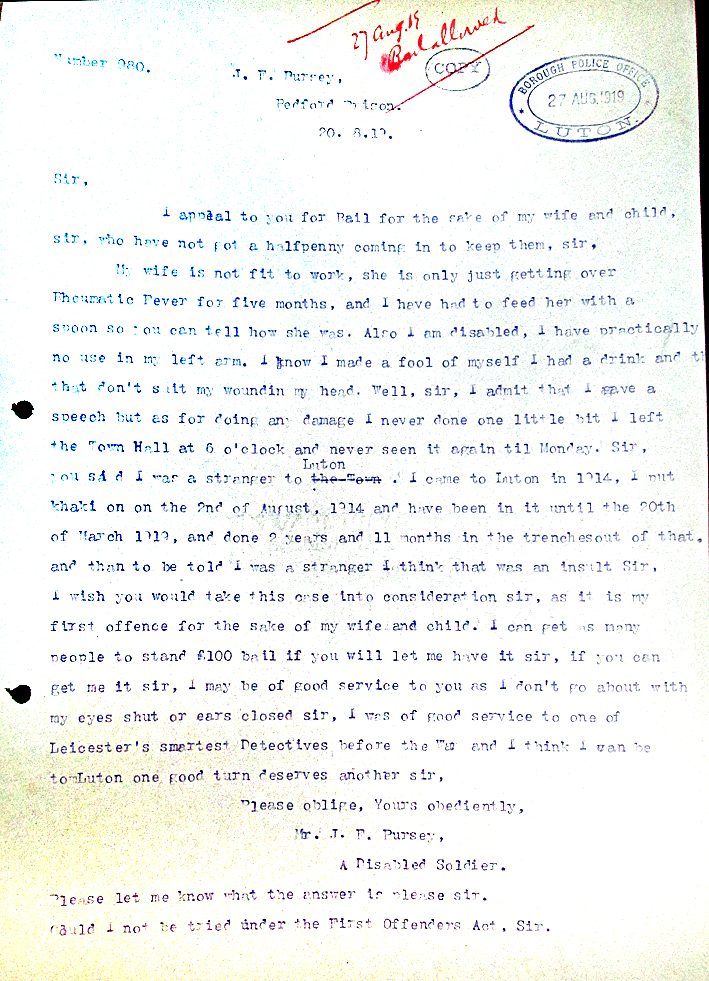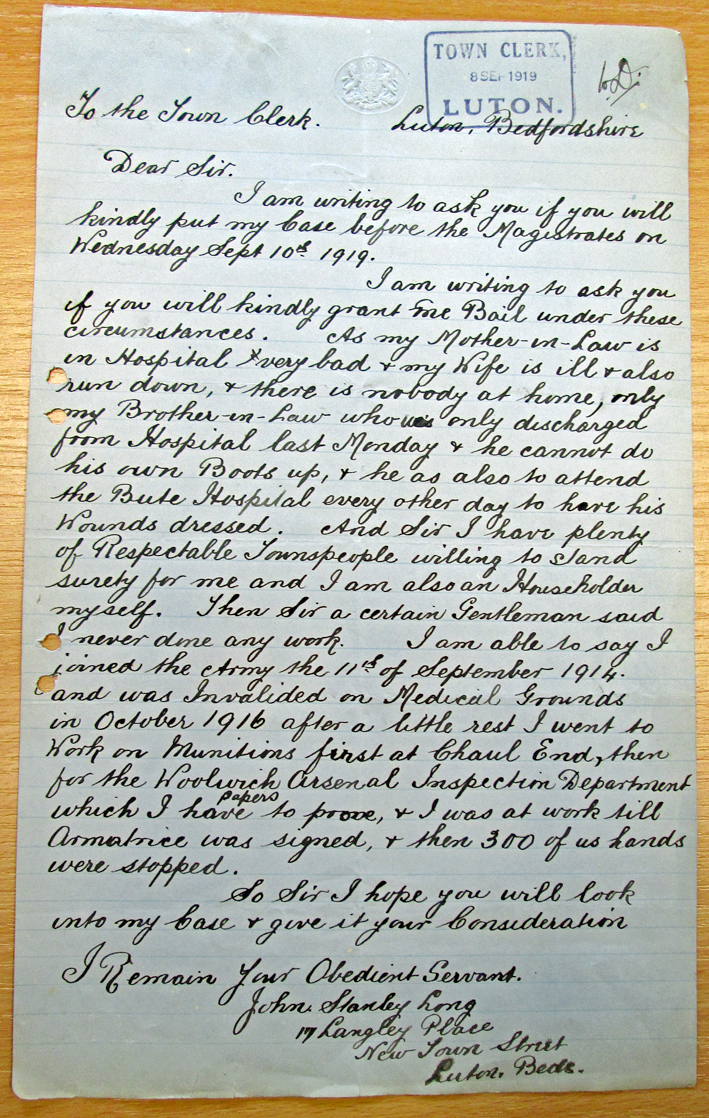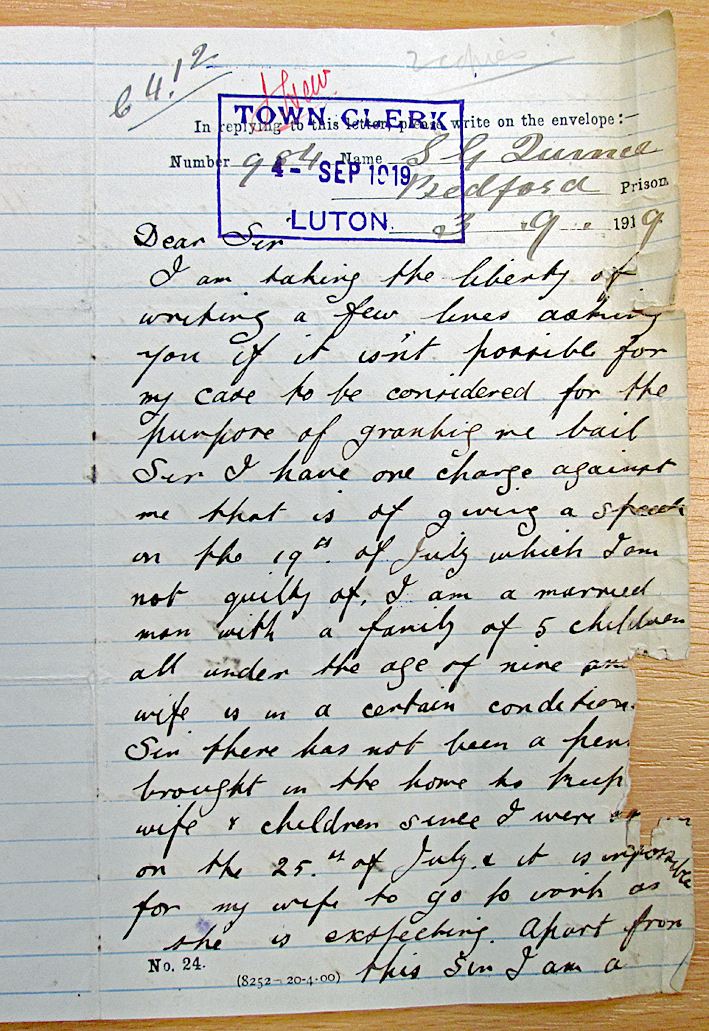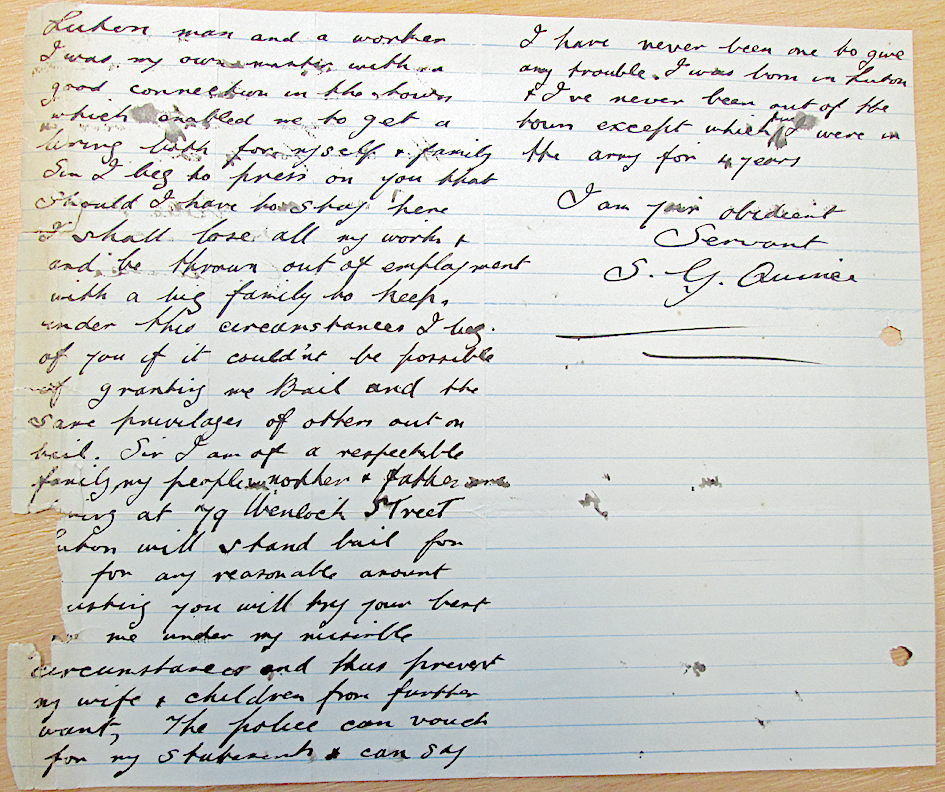
- A police typed copy of Joseph Frederick Pursey's bail application.
[The Luton News: Thursday, August 28, 1919]
Yesterday morning the committing magistrates in the Luton rioting prosecutions attended specially at the Luton Borough Court to consider an appeal for bail contained in a letter received by the police from Joseph Frederick Pursey, 26, attendant, of Midland Road, one of the men committed for trial in custody on charges of rioting and demolition in connection with the Peace Day disturbances.
In the letter, which was read by the Town Clerk, Pursey wrote: “I appeal to you for bail for the sake of my wife and child, who have not got a halfpenny and nothing to keep them. My wife is not fit to work. She is only just getting over rheumatic fever for five months, and I have had to feed her with a spoon, so you can tell how she was. Also I am disabled. I have practically no use in my left arm.
“I know I made a fool of myself. I had a drink, and that did not suit the wound in my head. I admit I gave a speech, but as for doing any damage I never did one little bit. I left the Town Hall at six o'clock and did not see it again till Monday.
“You said I was a stranger to Luton. I came to Luton in 1914, put on khaki on August 2nd, 1914, and have been in it until March 1919, and done two years and 11 months in the trenches out of that. Then to be told I was a stranger, I think that was an insult.
“I wish you would take my case into consideration, because it is my first offence, and for the sake of my wife and child. I can get as many people to stand £100 bail as required if you will let me have it.
“If you will let me out I may be of service to you. I do not go about with my eyes shut and ears closed. I was of good service to one of Leicester's smartest detectives before the war, and I think I can be to Luton. One good turn deserves another. Cannot I be tried as a first offender?”
The Town Clerk said he did not want the Bench to think for one minute that the police or himself were affected in the slightest degree by an offer of assistance from this man, although of course they would welcome any information which would reveal other offenders who had not yet been captured but who might be at a later date.
He had looked at the depositions, in so far as they concerned this man, and there was nothing in them relating to this man after the time he stated. He was one of the noisy men in the afternoon, one of the men who demanded the Mayor should come out.
Mr C. H. Osborne: “And the Town Clerk?” The Town Clerk: “I leave myself out. I am not anxious to advertise myself in a matter of this description, or in any other. What they wanted the Mayor for I don't know, but he gave the Mayor three minutes to come out, and counted the minutes.
“He attempted to pull the top of a lamp post off, incited the crowd, and also went up to the Mayor's residence, so it was not one isolated act.
“But having regard to the fact that the man has now had a taste of imprisonment for a month, has a wife who is not well, and two children, also also having regard to the fact that he has been in the Army and served his country, I do not oppose him having bail on the same conditions as the other people – that he is bound over to be of good behaviour pending the trial, and enters into a recognisance to appear.
“I feel now I am taking a somewhat serious responsibility, having regard to what the man has said in his letter. He has been wounded in the head and he had drink. There is no actual guarantee that when he comes out of prison pending his trial he will not be tempted if he has more drink to commit a further breach of the peace. If he does, of course, the matter will be dealt with in the proper way.
“Therefore those people who were present to offer themselves as sureties had better exert all the influence they have over him to leave the drink alone until his head is capable of standing it.”
Mr F. J. Brown (Chairman of the Bench) said the committing magistrates had very carefully considered the application, and had decided to grant bail – prisoner in £10, and two other sureties of £5 each, subject to good behaviour.
Two sureties immediately offered themselves, and it was stated by the Clerk (Mr William Austin) that the man would probably be released the following day.
Pursey was the second of 28 prisoners previously remanded in jail who was released on bail. On August 13th, Maud Kitchener, the only woman charged with rioting, was granted bail at Luton Borough Court in her own surety of £5 and two others of £10 each. She was at the same time bound over to keep the peace.
Two further prisoners charged with rioting offences who applied to be freed on bail were unsuccessful with applications made to committing magistrates in Luton on September 13th. They were John Stanley Long, 40 labourer, of 17 Langley Place, Luton, and Sidney George Quince, 29, labourer, of 66 Hitchin Road, Luton. Mr R. S. Tomson, Chairman of the Bench, stated that the applications made on behalf of the two men had been considered very carefully by the committing magistrates who had come to the conclusion that the applications could not be granted.

- ABOVE: The bail application letter from John Stanley Long. BELOW: The application from Sidney George Quince.



